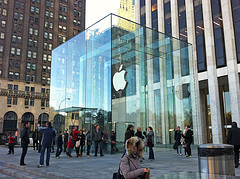Apple Exec: I Protected Consumers From High E-Book Prices By Letting Publishers Set High E-Book Prices
The Verge’s Greg Sandoval reports that the biggest revelation of the day came when Cue confirmed that, when deciding whether to get into the e-book market in the first place, he and late Apple CEO Steve Jobs had actually considered approaching Amazon with a deal — Apple wouldn’t sell books if Amazon didn’t sell downloadable music.
We’re not lawyers, but we’re pretty sure that would be collusion. It would certainly be anticompetitive and not cool.
But Apple didn’t do that. Instead, it went with what it viewed as a less-evil way of entering the e-book business — allow the publishers to set the retail price and just take a fixed percentage of whatever they charge. This so-called “agency model” quickly became the standard for most major publishers, meaning that all e-book sellers were offering the same price to consumers.
On the stand Cue said it didn’t matter because at least Apple could be assured that it was offering the lowest available price, so it wouldn’t have to slash its margins or take losses to compete with Amazon. He also acknowledged that e-book prices rose as a result. In many cases, it was less expensive to buy a paperback — which requires physical materials and has to be printed, bound, warehoused, shipped, warehoused again, then shipped again — online than it was to buy an e-book.
“Who protected Apple’s customers from the higher prices?” a Justice Dept. lawyer asked Cue.
“I did,” he replied. At this point, the prosecutor asked if Apple customers had thanked him for letting them pay higher prices for e-books.
All the publishers involved the DOJ complaint have settled, though none have actually admitted collusion or price-fixing, each claiming it was easier to settle and ditch the agency model than it would be to face a trial.
Apple continues to assert its innocence, though the DOJ has amassed a large pile of evidence it claims shows that the computer company was the driving force behind the switch to agency pricing. This includes an e-mail from Jobs to James Murdoch of News Corp, the parent company of HarperCollins, in which the late Apple CEO writes, “Throw in with Apple and see if we can all make a go of this to create a real mainstream e-books market at $12.99 and $14.99.”
In the pre-agency days, e-books on Amazon went for around $9.99, so prosecutors point to this e-mail as evidence that Apple used the lure of higher retail prices for the entire market as a way to make the switch to the new model.
Another e-mail uncovered by the DOJ has a top Random House executive claiming he was told by Apple to withhold his company’s titles from Amazon unless the online giant agreed to transition to agency pricing.
Want more consumer news? Visit our parent organization, Consumer Reports, for the latest on scams, recalls, and other consumer issues.


